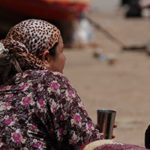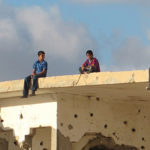This report reviews the literature on links between international food prices and political instability (including protests, riots and social unrest). The literature on food prices and protests, riots, unrest, or violent incidents consists mainly of peer-reviewed scholarly articles that utilise econometric modeling. Some early studies examined the links between international ...» more
Conflict sensitivity
Gender, countering violent extremism and women, peace and security in Kenya
Kenya ranks 109 out of 153 countries in the Global Gender Gap Report 2020, with a score of 0.671. There are significant inequalities between males and females in education attainment, health outcomes, representation in parliament, and labour force participation. This Factsheet outlines some of the top-line information on gender, countering violent extremism and women, peace and ...» more
The COVID-19 Pandemic and Response on Violent Extremist Recruitment and Radicalisation
This rapid evidence review provides evidence on the potential impacts of the COVID-19 pandemic and response on violent extremist recruitment and radicalisation. It draws on a mixture of academic and grey literature from multinational and bilateral institutions as well as nongovernment organisations (NGOs) and think tanks. Given the rapidly developing global context, it also ...» more
Automation of government processes
This rapid literature review examines the impact of, and lessons from, automating government processes in middle-income countries (MICs) and fragile and conflict affected environments (FCAEs). ...» more
Conflict analysis of The Philippines
This rapid literature review examines the main conflict and instability drivers in the Philippines. Key findings include: Conflict profile The conflict has been a longstanding feature of the Philippines, with two long-running insurgencies, and a number of other types of conflict and violence. The current situation is complex and dynamic, with an “increasingly fragmented ...» more
Benefits and risks of Big Data Analytics in fragile and conflict affected states
Big Data is an umbrella term for the large amounts of digital data continually generated by the global population. The main sources are data exhaust (largely from use of mobile phones), online information (e.g. social media), physical sensors (e.g. satellite imagery) and crowdsourced data (from citizens). Big Data for Development refers to sources of Big Data relevant to ...» more
Implications of Not Addressing Mental Health and Psychosocial Support (MHPSS) Needs in Conflict Situations
This review of existing literature indicates that there are a number of significant implications of not addressing mental health and psychosocial (MHPSS) needs of children, youth, and adults in conflict settings. Mental health consequences of war are by now fairly well documented (see for example Murthy and Lakshminarayana, 2006; Werner, 2012; Betancourt et al., 2014; ...» more
Effects of Violence in the Home on Children’s Mental Health and Psychosocial Wellbeing During Conflict
Being exposed to violence in the home during war increases children’s risk of developing problems in mental health and psychosocial wellbeing (MHPSW), a small but robust evidence base shows. Conversely, this evidence shows that supportive parenting can be a protective factor against the demonstrated negative effects of war on children’s MHPSW. Evidence from multiple sources ...» more
Conflict-sensitive cash transfers: social cohesion
The literature suggests that the effects of social protection initiatives such as cash transfers and vouchers on social cohesion are positive, but there is very little empirical evidence to back this. This review found no research comparing cash transfers and vouchers from the perspective of social cohesion. Experience of cash transfers in developing countries, including ...» more
Conflict-sensitive cash transfers: unintended negative consequences
Risks associated with cash transfer programmes in fragile contexts include theft, diversion, corruption, security, targeting, misuse by beneficiaries and inflationary effects. However, the literature indicates that – while different – these risks are no greater than those associated with other forms of aid, e.g. vouchers or in-kind goods, and could even be less. Cash transfer ...» more
Private sector engagement in fragile and conflict-affected settings
The private sector and private sector development (PSD) are considered to have a crucial role to play in contributing to economic recovery and addressing a number of drivers of fragility. Key findings of the review include: Fragile and conflict-affected settings pose challenges for engaging with the private sector. Significant internal and external imbalances are ...» more
Conflict sensitivity
Reflection among aid actors after the devastating genocide in Rwanda led to the realisation that humanitarian and development actors contributed to increasing tensions and exacerbating the conflict. Aid interventions have since been understood to become a part of the context – and in conflict settings, to become part of the conflict. This acknowledgement that aid is not neutral ...» more
Conflict sensitivity in education, the private sector and infrastructure development
Conflict sensitivity in education: There has been increasing awareness that education systems are not neutral. Education can exacerbate conflict if it increases social tensions or divisions between groups. This may be the case if: education policies and practice are inequitable; education systems reinforce identity grievances; or educational curricula promote militarism.It is ...» more
Conflict
Conflict is inherent in all societies and arises when two or more groups believe their interests are incompatible. ‘Conflict’ is not, however, interchangeable with ‘violence’. Non-violent resolution is possible when individuals and groups have trust in their governing structures, society and institutions to manage incompatible interests. Conflict becomes a problem when this ...» more
Conflict analysis of Algeria
Local and regional protests about a diverse range of socio-economic issues have been taking place in Algeria since 2011. However, much of the literature suggests that Algeria was not greatly affected by the protests emerging from the 'Arab Spring'. The Algerian government has succeeded in preventing protests from escalating to the levels witnessed in neighbouring countries ...» more
State fragility and social cohesion
This report reviews the relationship between social cohesion and state fragility – focusing on literature from 2010 onwards. There is no clear empirical understanding in the literature of how social cohesion contributes to state resilience or fragility, as it is very difficult to measure, and to assess independently other variables that impact on state fragility. Key points ...» more
Livelihoods in fragile contexts
There is strong literature on both livelihoods in general and livelihoods in fragile contexts, presenting conclusions and lessons from programmes and synthesising evidence from other contexts. This review draws mainly on lessons learned in the field, rather than rigorous evidence of impact. There are few impact studies conducted on programmes in fragile environments, as ...» more
Humanitarian response to the post-election violence in Kenya in 2007/8
Findings cover different aspects of the humanitarian response, including the overall response (preparedness, coordination), integration of protection concerns, early recovery programmes, funding approaches and instruments and security for humanitarian organisations. The main conclusions and lessons learned on the overall humanitarian response are that:None of the actors ...» more
Resource Management and Conflict
There is an extensive literature dedicated to examining the links between the abundance of mineral resources and the incidence and duration of violent conflict. While the ‘resource curse’ thesis has become well-known, claims that an abundance of natural resources increases the likelihood of conflict have been widely disputed.However, beyond the case study literature, there is ...» more
Mainstreaming Peace and Conflict Prevention in Zimbabwe
There are few resources detailing how peacebuilding, conflict prevention and conflict resolution have practically been integrated into developing and humanitarian programming in Zimbabwe. However the Zimbabwe literature is in-keeping with the general literature in that it talks about: a) governance; b) education; and c) developing the capacities of staff within these sectors. ...» more


